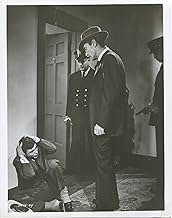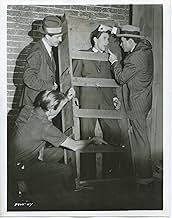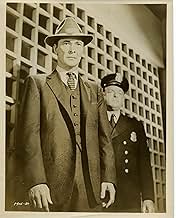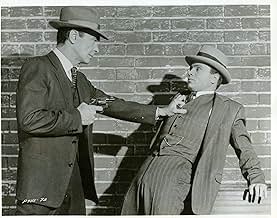Ajouter une intrigue dans votre langueThe story of the infamous Purple Gang, a ring of bootleggers, hijackers and killers in 1920s' Detroit.The story of the infamous Purple Gang, a ring of bootleggers, hijackers and killers in 1920s' Detroit.The story of the infamous Purple Gang, a ring of bootleggers, hijackers and killers in 1920s' Detroit.
Suzanne Ridgway
- Daisy
- (as Suzy Marquette)
Joe Turkel
- Eddie Olsen
- (as Joseph Turkel)
James Roosevelt
- Self in Prologue
- (as Congressman James Roosevelt)
Benjie Bancroft
- Police Officer
- (uncredited)
Avis en vedette
Low budget "exposee" style film paints a somewhat accurate picture of Detroit's Purple Gang from the 20s. Worth seeing for Robert Blake's performance, which transcends the movie.
This opens with a suit talking to the audience. The Purple Gang operated in Detroit during the late 20's and early 30's. They started out as bootleggers with Canadian liquor and quickly spread to all kinds of other crimes. The story begins with a teen gang called Purple led by William Joseph 'Honeyboy' Willard (Robert Blake). Police Lt. William P. Harley (Barry Sullivan) is assigned to clean it up. The kids take on the established mob and become their muscle. This launches them as the most violent criminals in the city.
I don't like the "Crime Does Not Pay" start. That takes this movie down to a B-short series. I also don't like them using a social worker as the foil. They could have used a lawyer, but they're trying to take down the bleeding heart liberal in a heavy handed way. The most interesting aspect of this is seeing Robert Blake. He's good, but that's about it.
I don't like the "Crime Does Not Pay" start. That takes this movie down to a B-short series. I also don't like them using a social worker as the foil. They could have used a lawyer, but they're trying to take down the bleeding heart liberal in a heavy handed way. The most interesting aspect of this is seeing Robert Blake. He's good, but that's about it.
During this period of the late Eisenhower and Kennedy years many studios started
making films of the notorious Prohibition and post Prohibition years. No coincidence that these were the years The Untouchables found a TV audience.
In 1959 Allied Artists put out the Purple Gang who were as rough a bunch in real life as any. When Al Capone tried to take over their Detroit territory the Purples sent Capone back limping to Chicago.
Allied Artists was the former Monogram Pictures so you knew it was going to be cheap. It certainly is a B product.
But it boasts an eletrifying performance by Robert Blake as the leader of the Purples. For that alone you should not miss this film.
But it ain't the real story of The Purple Gang.
In 1959 Allied Artists put out the Purple Gang who were as rough a bunch in real life as any. When Al Capone tried to take over their Detroit territory the Purples sent Capone back limping to Chicago.
Allied Artists was the former Monogram Pictures so you knew it was going to be cheap. It certainly is a B product.
But it boasts an eletrifying performance by Robert Blake as the leader of the Purples. For that alone you should not miss this film.
But it ain't the real story of The Purple Gang.
Most of my 7/10 goes to two things - Robert Blake's effective portrayal of completely amoral, calculating, and mentally unbalanced baby-faced mobster Honeyboy Willard and to the rather detached documentary feel of this film as it is narrated by the cop that has vowed to put the Purple Gang away, Barry Sullivan as Lt. William P. Harley of the Detroit Police. It really has the look and feel of "The Untouchables" except with poverty row roots.
There really was a Purple Gang in Detroit in the 20's and 30's, although the character of Honeyboy is a fictional one - the actual power in the real gang was in the hands of four Jewish brothers. The cleaner and dyers war was a real one, except in real life the Purple Gang was allied with the union against non-union independents. There was no rather clean ending to the story of the Purples in real life. Like so many other gangs, Prohibition gave them money and power they could have only dreamed about, and its end sent them on a slow decline with the primary source of their wealth literally dried up.
This film is unusual in that there are no female leads or even substantial female supporting roles here. Women are just the subjects of particularly savage crimes by the Purples, and very little more, meant to underscore the violence of the Purple Gang.
If this film had been in wider release by a bigger studio, maybe Robert Blake wouldn't have had to wait until 1967 and "In Cold Blood" to catapult to stardom. Here he steals the show, kills everyone else, and gives a truly riveting performance of a guy who really loves his work for reasons that seem to have more to do with a need for power and a desire to be feared than just pure greed. Don't believe the low rating on this one - give it a try realizing it is a B feature from a small studio made just as the production code was losing its grip.
There really was a Purple Gang in Detroit in the 20's and 30's, although the character of Honeyboy is a fictional one - the actual power in the real gang was in the hands of four Jewish brothers. The cleaner and dyers war was a real one, except in real life the Purple Gang was allied with the union against non-union independents. There was no rather clean ending to the story of the Purples in real life. Like so many other gangs, Prohibition gave them money and power they could have only dreamed about, and its end sent them on a slow decline with the primary source of their wealth literally dried up.
This film is unusual in that there are no female leads or even substantial female supporting roles here. Women are just the subjects of particularly savage crimes by the Purples, and very little more, meant to underscore the violence of the Purple Gang.
If this film had been in wider release by a bigger studio, maybe Robert Blake wouldn't have had to wait until 1967 and "In Cold Blood" to catapult to stardom. Here he steals the show, kills everyone else, and gives a truly riveting performance of a guy who really loves his work for reasons that seem to have more to do with a need for power and a desire to be feared than just pure greed. Don't believe the low rating on this one - give it a try realizing it is a B feature from a small studio made just as the production code was losing its grip.
Robert Blake's portrayal of Honeyboy is chillingly charismatic. Honeyboy leads his gang of teenage hoodlums to success in the big leagues of organized crime. The key to Honeyboy's success and his dedication as a "leader" lies in the fact that he is a sociopathic killer and a psychopathic egomaniac. Robert Blake plays it all to the hilt and still manages to make Honeyboy cute and sympathetic.
Le saviez-vous
- AnecdotesThe real Purple Gang was made up of mostly Jewish members. The script of this film gave the members non-Jewish names. It was the dominate criminal organization in Detroit from about 1927 until 1932 when the gang self-destructed - with help from the Italian mob.
- Citations
William Joseph 'Honeyboy' Willard: [instructing some henchmen before setting up a deal] No liquor, no junk and no broads when I'm runnin' the show.
- Générique farfelu[Prologue] This picture is based on information from official files which revealed the shocking story of the wave of juvenile delinquency which spawned Detroit's Purple Gang. Incredible as it may seem, this youthful rat-pack of terrorists dominated the city's underworld for more than a decade during the prohibition era.
Meilleurs choix
Connectez-vous pour évaluer et surveiller les recommandations personnalisées
Détails
- Durée1 heure 25 minutes
- Couleur
- Rapport de forme
- 1.85 : 1
Contribuer à cette page
Suggérer une modification ou ajouter du contenu manquant

































